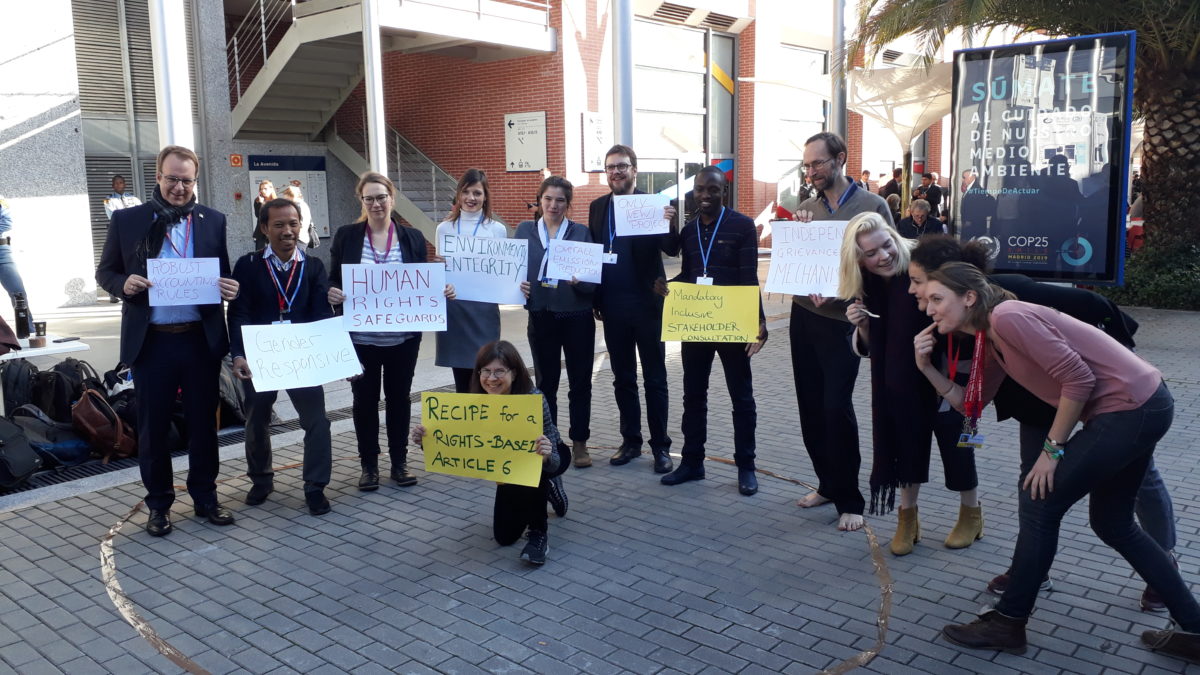CIDSE had high hopes that after a year of street action, alarming science; more extreme fires, drought and storms hitting vulnerable communities; and under a Conference banner of “Time for action”, we would see strong decisions. Instead, these climate talks followed the dominance of capital; blocking ambition and commitments on climate finance. Debate on carbon trading rules floundered as powerful countries with vested interests such as Australia and Brazil looked for loopholes.
It is time for the richer nations to put their money where their mouth is and help the poorest adapt to climate change, while addressing present and future loss and damage, and promote agriculture that helps all to live gently on the earth.
Rights-bAsed approaches
Human rights should be explicitly recognized in any key new rules (to move a step further beyond the mention in the Preamble to the Paris Agreement – PA). Human rights are often omitted in the development of policies and guidance for the implementation of the PA such as poverty alleviation, rights of Indigenous Peoples, public participation and transparency, gender equality and women’s empowerment, food security, just transition for workers and decent work, intergenerational justice, and ecosystem integrity.
At this COP, progress was made in an enhanced work programme on gender and the Gender Action Plan, that includes now language on rights-based approaches.
In other areas, human rights were sidelined or minimised, especially in the arguments around Article 6 on carbon trading. Yet, they are fundamental to a future for the poor, future generations and possibly human existence on this planet.
(UN)AmbitioUS implementation plans
All parties to the Paris Agreement are expected to submit stronger national climate plans in 2020. We were looking for signals that these would be set at a level consistent with limiting temperature rise to 1.5°C. We also sought for early submission by the beginning of September, to enable a UN assessment of the gap between what is pledged and what is needed.
Only a few countries took the opportunity to announce more ambitious plans (see High Ambition Alliance). However, there was no agreement on a timeframe for submission, with the final draft decision text of COP25 simply saying: “Stresses the urgency of enhanced ambition in order to ensure the highest possible mitigation and adaptation efforts by all Parties”.
In light of the failure of collective ambition towards 2030, the EU must step up in its professed climate leadership role and substantially increase its 2030 climate pledge early in 2020.
Climate finance
We were looking for signals of higher commitment to climate finance for 2020, including stronger commitment to adaptation.
Here again, COP25 failed to deliver. The final decision simply ‘recalling’ the commitment made by developed country Parties to a goal of mobilizing USD 100 billion per year by 2020 to address the needs of developing countries; and vaguely calling on “international entities” to continue supporting “measures to avert, minimize and address the adverse impacts of climate change”.
In particular, and in solidarity with those most affected by climate change, CIDSE is deeply disappointed that there is no commitment to additional finance and a financial mechanism to address loss and damage. Very limited progress was made on the review of the Warsaw International Mechanism (WIM) on loss and damage, including a request to clarify how developing countries may access funding from the Green Climate Fund and and other financial mechanisms under the UNFCCC and Paris Agreement, to address loss and damage in developing countries due to climate change. However, this clarification does not guarantee more money will be provided. There was also a decision to establish an expert group to develop a focused plan of action for the WIM, and ‘the Santiago network’ to facilitate technical assistance and support between countries. The question of governance for the Warsaw International Mechanism was deferred to COP26.
Article 6 on carbon trading
CIDSE does not advocate for carbon trading as an effective tool for national commitment to reduce emissions. We considered that an effective Article 6 would only work if it had all these elements: robust accounting rules, gender responsiveness, human rights safeguards, environmental integrity, no carryover of projects from earlier schemes, mandatory inclusive stakeholder consultation and an independent grievance mechanism.
In light of this, and in view of the determined efforts by a few countries to create loopholes, including double-counting and carryover of Clean Development Mechanism (CDM) credits, we welcome that discussion on Article 6 has been further deferred to COP26. This gives more time to establish fair, just and robust rules around carbon trading – if they are written at all.
Photo credit: CIDSE


Pingback: COP25 – À procura de ambição, financiamento e Direitos Humanos | FEC